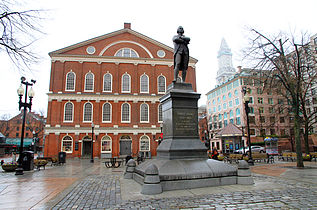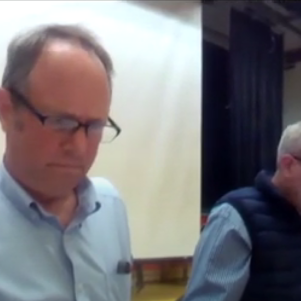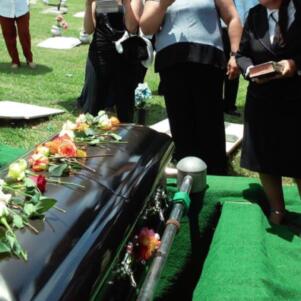Slave Auction Artwork Outside Faneuil Hall Not Enough for Activists Who Want ‘Faneuil’ Removed
By NBP Staff | February 22, 2019, 19:22 EST

A group seeking to change the name of Faneuil Hall in Boston because the man it’s named after was a slave owner and slave trader praised Mayor Marty Walsh for allocating money for a slavery monument, but they still want Faneuil’s name gone from the historic building.
“The mayor is responding to calls for a hearing with second-tier prizes. We will take the second prizes but our eyes are on the prize of being granted a hearing on the issue which he currently opposes,” said Kevin Peterson, of the New Democracy Coalition, in a written statement Friday.
Faneuil Hall is named for Peter Faneuil (1700-1743), a merchant who donated the building to the town of Boston as a market place and meeting place. The original version of the building (which has since been enlarged) opened in 1742.
Peterson made a distinction between Faneuil and certain other prominent slave owners in America during the 18th century.
“Unlike George Washington or Thomas Jefferson, Peter Faneuil made no great contribution to our nation’s democracy,” Peterson said in the statement.
Instead, Peterson said, Faneuil is more like a mass murderer.
“There are no streets in Boston named after Benito Mussolini, Joseph Stalin or Pol Pot. There should not be an edifice celebrating freedom that is named after Peter Faneuil,” Peterson said.
Faneuil Hall is known as a Cradle of Liberty because so many meetings resisting British policies took place there during the run-up to the American Revolution.
Faneuil wasn’t around for that, dying unexpectedly in 1743 at age 42, not long after the building was finished. Unmarried and without children, he left his possessions, including five slaves, to his brother.
Faneuil’s contemporaries thought highly of him, not just because of the building he gave the town but also for his charitable works. He was a major benefactor of his church and to poor people, according to his eulogist.
Much of his wealth was built on the so-called “Triangular Trade,” which involved buying raw slaves in Africa, trading them in the West Indies for rum, molasses, and more experienced slaves, and bringing the rum and molasses and experienced slaves to Boston. He also traded with Europe.
Walsh’s administration is proposing $315,000 for art depicting and commemorating a slave auction outside Faneuil Hall.
Walsh has opposed renaming Faneuil Hall.











